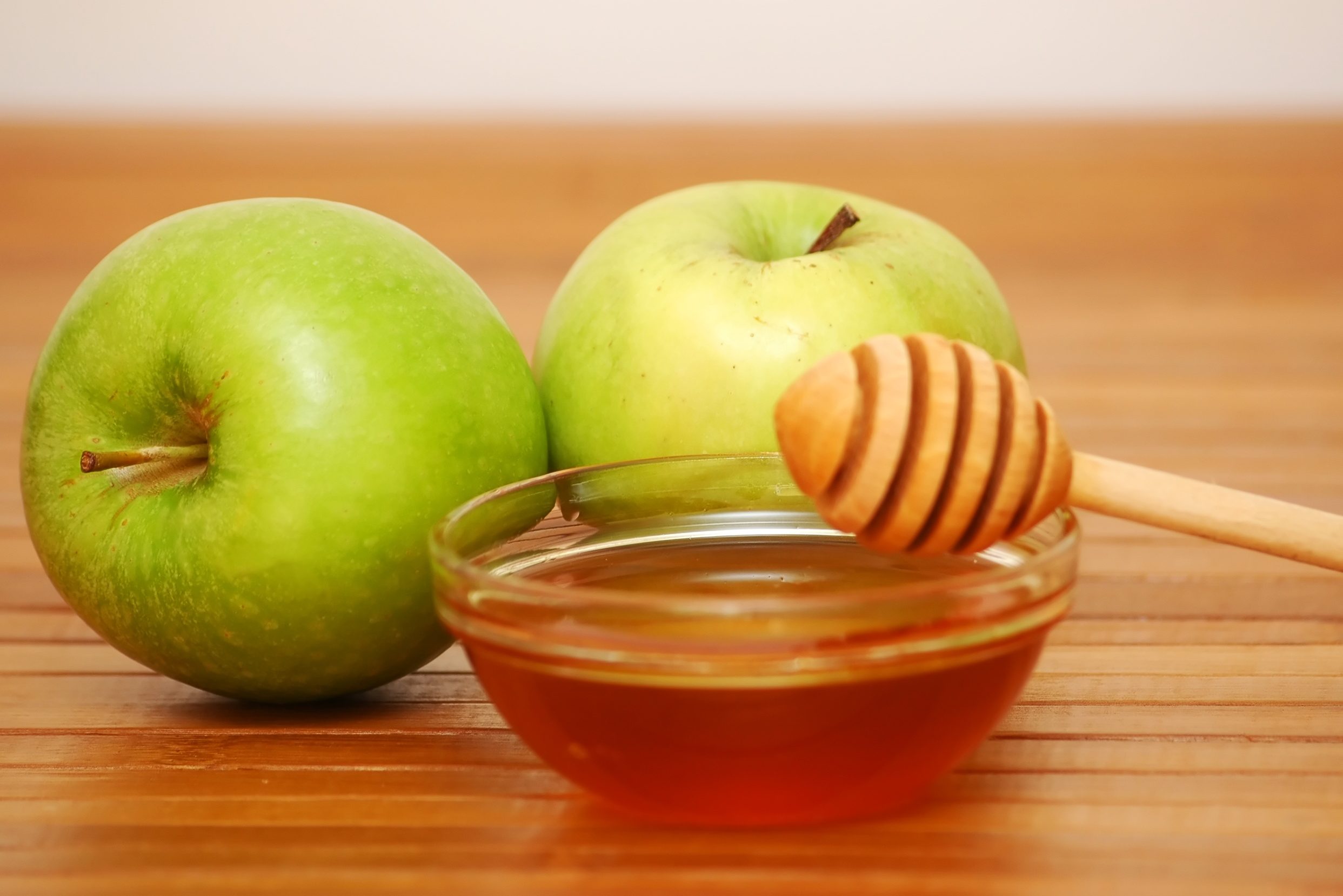It is customary on Rosh Hashanah, during the evening meals, to eat foods symbolizing sweetness, blessings, and abundance.
We dip the challah in honey; and afterwards, on the first night, we eat a piece of apple dipped in honey. In general, this time of year is a very profitable one for those in the honey business, as some families have the custom of using honey instead of salt for challah right through Sukkot and Shmini Atzeret, and honey is also a main ingredient in many holiday recipes.
After the appropriate blessing on the apple, we add: “May it be Your will to renew for us a good and sweet year.” Other customs include eating the head of a fish (1), pomegranates (2) and carrots (3). These foods are eaten as “simanim,” “good omens,” of success and happiness for the coming year.
It is customary to refrain from sleep (4) during the day of Rosh HaShanah, and rather to engage in Torah study or other spiritually productive activity. If one is idle, it is as if he slept. The Talmud Yerushalmi writes, “If one sleeps at the year’s beginning, his good fortune likewise sleeps.”
It is customary to avoid eating nuts (5) on Rosh Hashanah, mainly because the gematria (numeric value) of the Hebrew word for “nut,” “egoz” is the same as that for the Hebrew word for “sin,” “chet.”.
One should be especially careful to avoid anger on Rosh HaShanah. Always remember that G-d judges us in the same manner that we judge other people. If we get angry easily, so too will He.
——————————————————————————–
(1) Head of a Fish, And Anything You Wish!
The symbolism of the head is that we should be “on top” and not “on the bottom.” The symbolism of the fish is based on the fact that they are very fertile creatures, but their reproductive activity is hidden from view, and therefore one could say that they embody the very desirable characteristic of “tzniut,” “modesty.”
(2) Pomegranates (Count those Seeds!)
The symbolism of this fruit is based on the “fact” that it contains as many seeds as there are Mitzvot (Torah Obligations), namely six hundred thirteen (613); you are free to count them if you wish. We want to be as full of Mitzvot as the Pomegranate is full of seeds.
(3) Carrots (Bugs Bunny’s Favorite Food)
The symbolism of this vegetable is based not on the eating habits of the animated rabbit, but rather on the fact that in Yiddish, the word for carrots is “merren,” having the additional connotation of “more.” We want to have more children, have more wealth, gain more Torah knowledge, give more charity and perform more good deeds.
(4) Refraining from Sleep
However, one need not “go overboard” here. That is, if one is extremely tired, and cannot function like a human being without some rest (this is not unlikely on the afternoon of Rosh HaShanah, when the morning services are the longest, and perhaps most meaningful, of the year, besides Yom Kippur, which is a different story altogether), it would be better to take a short nap and then return, refreshed, to activity appropriate for Rosh HaShanah.
(5)No Nuts (unless you’re hopelessly addicted)
Gematria
From the Greek, but in this case, not referring to Euclid’s ideas, but rather to the sum, for a given word or verse, of the “numerical equivalents” of its Hebrew letters. Eh? Let’s give an example: The derivation of the “gematria” of the Hebrew word for garment, “beged” is shown below:
Gematria of “Beged”
Hebrew Letter Numerical Equivalent
“Bet” 2
“Gimel” 3
“Dalet” 4
Gematria = 9
The problem here is that the gematria of “egoz,” is not exactly equal to the gematria of “chet.” (To confuse matters, note that the word “chet,” as an action, means “sin,” but there is also a letter called “chet,” which is undoubtedly significant)
Gematria of “Egoz”
Hebrew Letter Numerical Equivalent
“Aleph” 1
“Gimel” 3
“Vav” 6
“Zayin” 7
Gematria = 17
Gematria of “Chet”
Hebrew Letter Numerical Equivalent
“Chet” 8
“Tet” 9
“Aleph” 1
Gematria = 18
However, since the Torah sage who suggested this idea was undoubtedly as capable of doing simple addition as you or I, we must say that since the values are nearly equal, on Rosh HaShanah we want to be extra careful of even a ” remez,” a “hint” of sin. So nuts are out! If you are hopelessly addicted to them, and your response to the above is “Nuts!” because you can’t imagine living without them, you can probably eat nuts.
